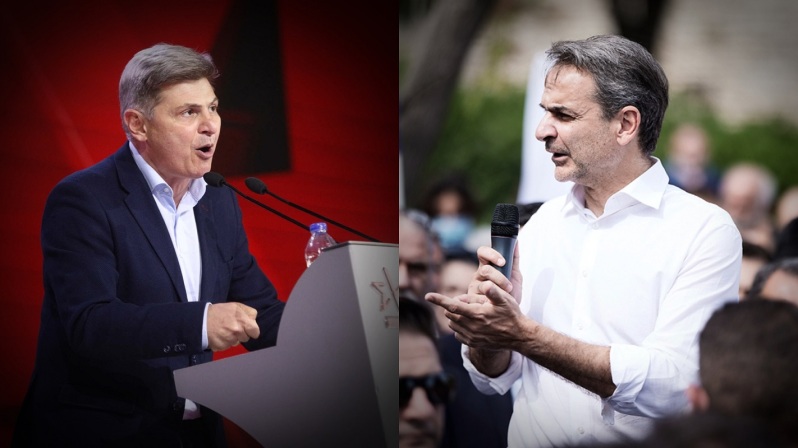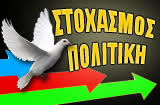Σχετικά: “Jobless Recovery”... Ένα σουτιέν, μία ημέρα δουλειά… Όταν ο Γ. Παπανδρέου μιλούσε για την ανάπτυξη... το outsourcing και ότι θα τονωθεί η ανάπτυξη και θα μειωθεί και η ανεργία!
Η Οργάνωση Fashion Revolution βρήκε μια πρωτότυπη ιδέα για να ενημερώσει τον κόσμο για το πραγματικό τίμημα των φτηνών ρούχων. Έστησε ένα αυτόματο πωλητή σε κεντρικό δρόμο στο Βερολίνο όπου μπορούσε κάποιος να αγοράσει ένα μπλουζάκι μόνο με 2 ευρώ.
Όταν κάποιος έριχνε όμως μέσα το νόμισμα, η οθόνη παρουσίαζε την ιστορία της Manisha, μιας νεαρής που εργάζεται επί 16 ώρες κάθε μέρα για 13 σεντ την ώρα. Η ιστορία αυτή δεν είναι η μοναδική, καθώς τα ρούχα σε πολύ χαμηλές τιμές έχουν συχνά κάποιο τίμημα. Τέλος, οι περαστικοί είχαν την επιλογή να αγοράσουν την μπλούζα ή να κάνουν δώρο τα €2 σε φιλανθρωπική οργάνωση που μάχεται κατά της ανθρώπινης εκμετάλλευσης:
Fashion for a bargain - that‘s what everyone wants. A T-Shirt for 2€ isn‘t inconceivable nowadays. Unfortunately, people don‘t often consider who is paying the real price. #whomademyclothes
We placed a bright turquoise vending machine, offering t-shirts for 2 Euros, at Alexanderplatz in Berlin, to test whether people would still buy it when they are confronted with the conditions in which it was produced. Eight out of ten shoppers decided against it!
We need to challenge brands and retailers to take responsibility for the people and communities on which their business depends. Ask the brands whose clothes you love #whomademyclothes and help start a Fashion Revolution.
24 April was Fashion Revolution Day which is held in memory of the 1,133 workers killed in 2013 when the Rana Plaza garment factory in Bangladesh collapsed. We need greater transparency in the fashion supply chain because we can't improve conditions or protect the environment without knowing where our clothes are made.
If you would like to support our campaign and help to build a better future for everyone in the global fashion supply chain, please donate via the following link http://fashionrevolution.org/get-invo...
Join the revolution at: http://fashionrevolution.org/
contact for video requests: Annett Borg: info@fashionrevolutiongermany.org
Facebook: https://www.facebook.com/fashionrevol...
https://www.facebook.com/fashionrevol...
Twitter: https://twitter.com/fash_rev
COMMENTS:
Wow - Thank you so much for your response and overwhelming feedback!
Thanks for watching and please keep on sharing our message!
We’re very grateful for all your comments and will try and answer them within our capacity but might not get to every single question.
In general we would like to say the following:
Fashion Revolution's mission is to achieve more transparency in global textile supply chains and work to improve working conditions in the manufacturing countries. We believe in a fashion industry that values people, the environment and creativity in equal measure.
We DO NOT want you to stop buying clothes made in Bangladesh, India, Vietnam, China, Cambodia, etc. but ask brands who sell clothing produced in these countries to take responsibility for the people and communities on which their business depends.
Re: Where do the donations end up?:
This was an experiment and initially the money was handed back to the people using the vending machine in the video.
However €250 were collected by people who explicitly wanted to donate which we will now pass on to the OPORAJEO Project, which was setup after the Rana Plaza disaster on April 24th, 2013 to create job opportunities for some of the survivors as a rehabilitation program.
http://oporajeo.com/
Re: Where can I buy ethically produced clothing?:
We’re not asking people to boycott their favourite stores, we need to change the fashion industry from within. By asking the brands and retailers where we like to shop Who Made My Clothes? we can put pressure on them to be more transparent about their supply chains.
If you do want to know how brands measure up, we recommend checking http://www.free2work.org/ orhttp://rankabrand.org/
Additionally watch out for the labels of global organisations who help to improve global working conditions in the textile industry such as Fairtrade and Fair Wear Foundation.
You can also check the following labels for more sustainable fashion (GOTS), TextileExchange & Blue Sign. Also second hand or upcycled clothing are another option.
Re: Who is to say Manisha will earn a better wage if I buy a €50 Tshirt?:
If you buy cheap fashion it is very unlikely to have been produced in an ethical way. However, buying expensive clothing is no guarantee that the people who made it got paid a fair wage or enjoyed good working conditions - often it will have been made on the same production line as a fast fashion brand.
This is why we work for more transparency and want people to ask their brand: Who Made My Cothes?
This should be a simple question, but a new Behind the Barcode Report published to coincide with Fashion Revolution Day found that 48% of brands hadn’t traced the factories where their garments were made, 75% didn't know the provenance of their fabrics and 91% didn’t know where the raw materials came from. We need to build a more open and connected fashion supply chain because greater transparency is a prerequisite to improving conditions.
==========================
"O σιωπών δοκεί συναινείν"
Όταν κάποιος έριχνε όμως μέσα το νόμισμα, η οθόνη παρουσίαζε την ιστορία της Manisha, μιας νεαρής που εργάζεται επί 16 ώρες κάθε μέρα για 13 σεντ την ώρα. Η ιστορία αυτή δεν είναι η μοναδική, καθώς τα ρούχα σε πολύ χαμηλές τιμές έχουν συχνά κάποιο τίμημα. Τέλος, οι περαστικοί είχαν την επιλογή να αγοράσουν την μπλούζα ή να κάνουν δώρο τα €2 σε φιλανθρωπική οργάνωση που μάχεται κατά της ανθρώπινης εκμετάλλευσης:
Fashion for a bargain - that‘s what everyone wants. A T-Shirt for 2€ isn‘t inconceivable nowadays. Unfortunately, people don‘t often consider who is paying the real price. #whomademyclothes
We placed a bright turquoise vending machine, offering t-shirts for 2 Euros, at Alexanderplatz in Berlin, to test whether people would still buy it when they are confronted with the conditions in which it was produced. Eight out of ten shoppers decided against it!
We need to challenge brands and retailers to take responsibility for the people and communities on which their business depends. Ask the brands whose clothes you love #whomademyclothes and help start a Fashion Revolution.
24 April was Fashion Revolution Day which is held in memory of the 1,133 workers killed in 2013 when the Rana Plaza garment factory in Bangladesh collapsed. We need greater transparency in the fashion supply chain because we can't improve conditions or protect the environment without knowing where our clothes are made.
If you would like to support our campaign and help to build a better future for everyone in the global fashion supply chain, please donate via the following link http://fashionrevolution.org/get-invo...
Join the revolution at: http://fashionrevolution.org/
contact for video requests: Annett Borg: info@fashionrevolutiongermany.org
Facebook: https://www.facebook.com/fashionrevol...
https://www.facebook.com/fashionrevol...
Twitter: https://twitter.com/fash_rev
COMMENTS:
Wow - Thank you so much for your response and overwhelming feedback!
Thanks for watching and please keep on sharing our message!
We’re very grateful for all your comments and will try and answer them within our capacity but might not get to every single question.
In general we would like to say the following:
Fashion Revolution's mission is to achieve more transparency in global textile supply chains and work to improve working conditions in the manufacturing countries. We believe in a fashion industry that values people, the environment and creativity in equal measure.
We DO NOT want you to stop buying clothes made in Bangladesh, India, Vietnam, China, Cambodia, etc. but ask brands who sell clothing produced in these countries to take responsibility for the people and communities on which their business depends.
Re: Where do the donations end up?:
This was an experiment and initially the money was handed back to the people using the vending machine in the video.
However €250 were collected by people who explicitly wanted to donate which we will now pass on to the OPORAJEO Project, which was setup after the Rana Plaza disaster on April 24th, 2013 to create job opportunities for some of the survivors as a rehabilitation program.
http://oporajeo.com/
Re: Where can I buy ethically produced clothing?:
We’re not asking people to boycott their favourite stores, we need to change the fashion industry from within. By asking the brands and retailers where we like to shop Who Made My Clothes? we can put pressure on them to be more transparent about their supply chains.
If you do want to know how brands measure up, we recommend checking http://www.free2work.org/ orhttp://rankabrand.org/
Additionally watch out for the labels of global organisations who help to improve global working conditions in the textile industry such as Fairtrade and Fair Wear Foundation.
You can also check the following labels for more sustainable fashion (GOTS), TextileExchange & Blue Sign. Also second hand or upcycled clothing are another option.
Re: Who is to say Manisha will earn a better wage if I buy a €50 Tshirt?:
If you buy cheap fashion it is very unlikely to have been produced in an ethical way. However, buying expensive clothing is no guarantee that the people who made it got paid a fair wage or enjoyed good working conditions - often it will have been made on the same production line as a fast fashion brand.
This is why we work for more transparency and want people to ask their brand: Who Made My Cothes?
This should be a simple question, but a new Behind the Barcode Report published to coincide with Fashion Revolution Day found that 48% of brands hadn’t traced the factories where their garments were made, 75% didn't know the provenance of their fabrics and 91% didn’t know where the raw materials came from. We need to build a more open and connected fashion supply chain because greater transparency is a prerequisite to improving conditions.
==========================
"O σιωπών δοκεί συναινείν"










Δεν υπάρχουν σχόλια:
Δημοσίευση σχολίου
To μπλόκ " Στοχσμός-Πολιτική" είναι υπεύθυνο μόνο για τα δικά του σχόλια κι όχι για αυτά των αναγνωστών του...Eπίσης δεν υιοθετεί απόψεις από καταγγελίες και σχόλια αναγνωστών καθώς και άρθρα που το περιεχόμενο τους προέρχεται από άλλες σελίδες και αναδημοσιεύονται στον παρόντα ιστότοπο και ως εκ τούτου δεν φέρει οποιασδήποτε φύσεως ευθύνη.